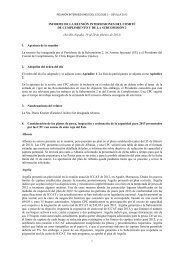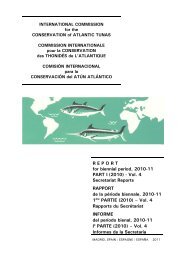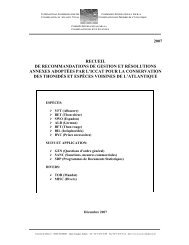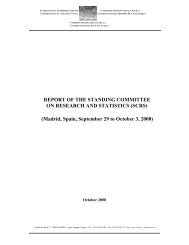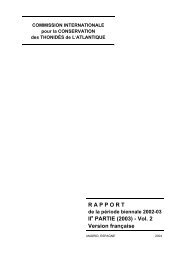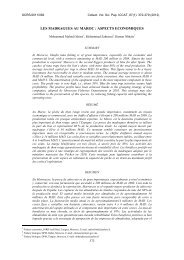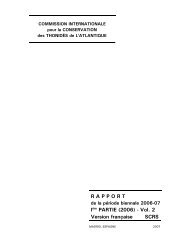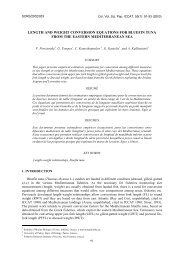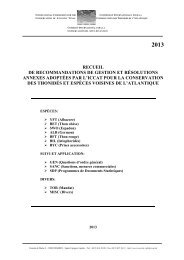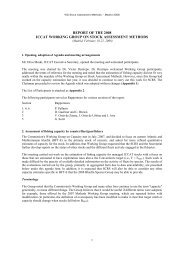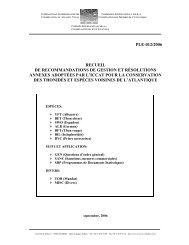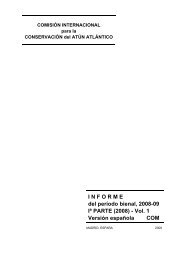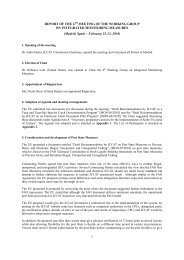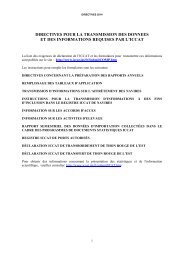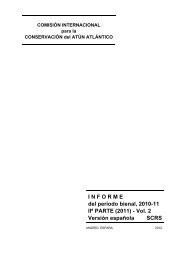E - Iccat
E - Iccat
E - Iccat
You also want an ePaper? Increase the reach of your titles
YUMPU automatically turns print PDFs into web optimized ePapers that Google loves.
3 rd WG FUTURE OF ICCAT – MADRID 2012<br />
To more clearly incorporate the precautionary approach, amendments to the Convention should include, at a<br />
minimum, the following elements:<br />
♦ A provision that establishes the precautionary approach as a guiding tenet of Commission, as proposed in<br />
section above (“Convention objective, principles, and approaches”);<br />
♦ Stocks should be managed for their long-term conservation and sustainable use, appropriately taking into<br />
account scientific uncertainty.<br />
Several recent multilateral fisheries agreements, including the Amendment to the Convention on Future<br />
Multilateral Cooperation in the Northwest Atlantic Fisheries (NAFO Convention), the Convention on the<br />
Conservation and Management of Highly Migratory Fish Stocks in the Western and Central Pacific (WCPFC<br />
Convention), and the Convention on the Conservation and Management of the High Seas Fishery Resources of<br />
the South Pacific Ocean (SPRFMO Convention) incorporate the precautionary approach as reflected in the UN<br />
Agreement on Straddling Fish Stocks and Highly Migratory Fish Stocks (UNFSA) and the FAO Code of<br />
Conduct for Responsible Fisheries and offer useful examples to consider.<br />
Ecosystem considerations and Convention scope. ICCAT's objective as set forth in the Convention must move<br />
beyond a focus on managing only tuna and tuna-like species in a manner that achieves maximum sustainable<br />
yield to more fully reflect a comprehensive ecosystem approach. Toward that end, we believe ICCAT needs to<br />
clarify the scope of the ICCAT Convention with respect to target and bycatch species so that there is no<br />
misunderstanding about what falls within ICCAT's mandate. The urgency of this matter is clear. Some CPCs<br />
have already expressed uncertainty about ICCAT's ability to adopt management measures for certain species,<br />
such as sharks. Failure to more formally incorporate the ecosystem approach into ICCAT’s Convention and to<br />
address questions of Convention scope decisively and for the long term could undermine ICCAT's ability to<br />
ensure the conservation and management of important ocean resources. The United States believes that<br />
clarifying the scope of the Convention would require amendments to the preamble, Articles IV, and Article VIII.<br />
At a minimum, the amendments should contain the following elements in order to adequately address this issue:<br />
♦ Clarity in ICCAT’s authority to manage non-tuna, highly migratory fish species found in the Convention<br />
area;<br />
♦ Clarity in ICCAT’s authority to adopt conservation and management measures for species belonging to<br />
the same ecosystem and that are affected by fishing for, or dependent on or associated with, ICCAT<br />
species;<br />
♦ The unambiguous authority to adopt standards for the responsible conduct of fishing operations;<br />
♦ Addition of the concept of ecosystem-based management in a new section to the Convention setting forth<br />
guiding principles and approaches as discussed above.<br />
Some of these changes could be accomplished, at least in part, by amending the scope of species referred to in<br />
the preamble, deleting the text “(the Scombriformes with the exception of the families Trichiuridae and<br />
Gempylidae and the genus Scomber)” in Article IV, and/or through other means.<br />
The Convention for the Strengthening of the Inter-American Tropical Tuna Commission Established by the 1949<br />
Convention between the United States of America and the Republic of Costa Rica (Antigua Convention) and the<br />
WCPFC Convention provide useful models to consider in addressing this important priority.<br />
Decision-making processes. There are a variety of provisions in the ICCAT Convention related to decisionmaking<br />
that are unclear, confusing, and/or out of step with other international fisheries instruments and ICCAT's<br />
current and future operational needs. Provisions identified in the Future of ICCAT process in this regard include:<br />
(1) timing of entry-into-force of recommendations, (2) objection procedures, (3) voting rules, and (4) dispute<br />
settlement procedures. The need for clarification on these issues is clearly highlighted by the significant<br />
difficulties encountered in recent months and years associated with votes, objections, and entry into force dates<br />
as well as disagreements between CPCs concerning the proper interpretation or application of ICCAT<br />
requirements. Convention amendment is necessary to address fully all aspects associated with these four items.<br />
We must modernize and clarify the Convention's decision-making provisions to ensure consistent and<br />
transparent application and to make the organization as efficient and effective as possible.<br />
Timing of entry into force of recommendations: Article VIII of the ICCAT Convention specifies that<br />
recommendations shall become effective six months after the date they have been transmitted to the Contracting<br />
Parties. This long time period was necessary to account for the delays associated with international<br />
119



